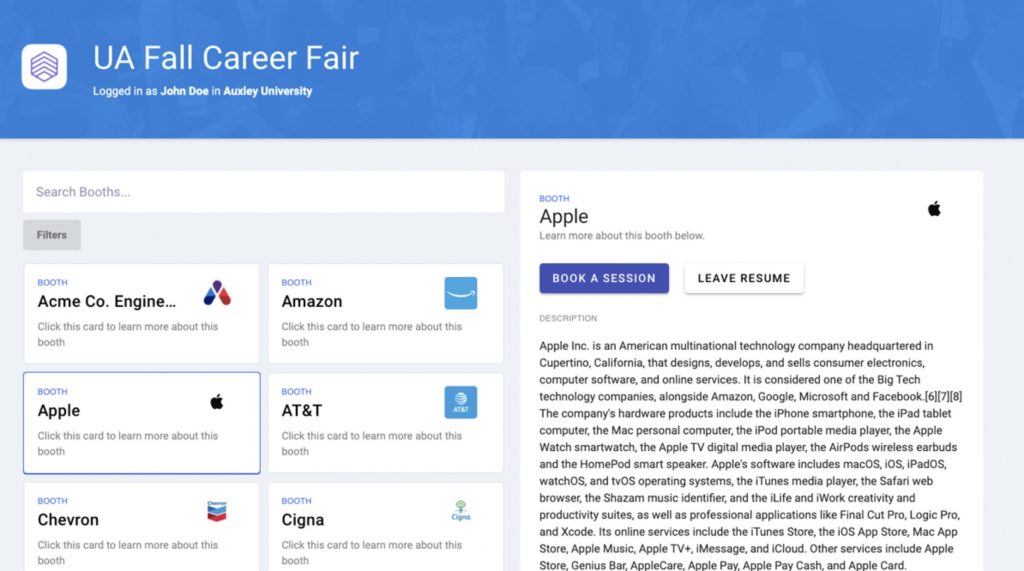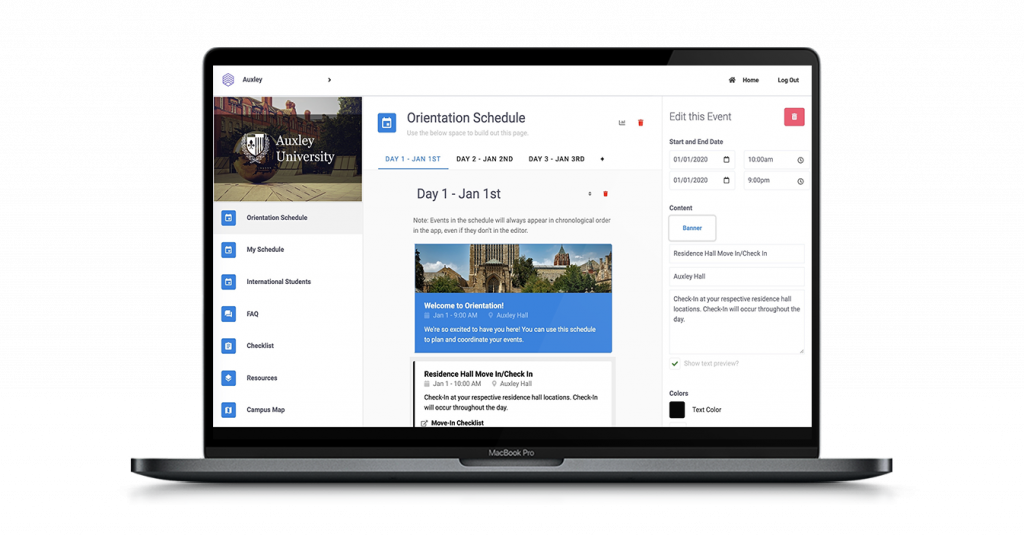Introduction
To host a virtual fair, there are several platforms available to choose from. That said, not all of them may have the proper features to service the unique needs of universities.
For instance, some have expensive bells and whistles that aren’t needed while others may not be up to par with the user experience standards of young college students. This variance is due to the fact that many virtual career fair providers oftentimes are developed with a specific audience in mind that may not necessarily be university-specific.
Below, we walk through the top features that you should look out for when planning a virtual career fair specifically for a student audience at a university.
—
If you are new to the concept of virtual career fairs, please refer back to this article: What is a Virtual Career Fair?
Modern User Interface
An absolute must in any virtual career fair platform for a university audience is a modern user interface.

University students today have grown up using social platforms such as Instagram and Snapchat which all boast the most up-to-date user interfaces.
Consequently, if you end up hosting your virtual career fair on a platform that looks like something that was developed in the nineties, chances are that your student audience will not have a good experience and may end up being put off from taking part in your fair.
Smooth Communication Medium
In a similar vein, a virtual career fair platform for universities should offer a smooth communication medium that’s free of hiccups and slow downs.
Once again, students are no strangers to virtual communication mediums. Since Gen-Z and Millennial dominated platforms such as Instagram and Snapchat are all powered through video chat and instant messaging, students expect smooth communication capabilities from any platform that they use.
Consequently, your virtual career fair platform should have similar ease of use when it comes to the communication medium that’s provided, whether it’s video chat or text chat. Any slowdowns or hiccups that arise in the communication channel of your virtual fair platform will be seen as unacceptable by a student audience.
Digital Resources

University students oftentimes are new to the world of job searching and career prep. Given that most university students are undergraduates coming fresh out of high school, they won’t have a solid grasp of things like a clear elevator pitch, refined resume, dress etiquette, etc.
Consequently, a virtual career fair platform for universities should offer a means to host digital resources so that career fair coordinators can incorporate material for students to prepare with.
Virtual career fair platforms without a robust digital resource feature will most likely not be able to properly accommodate the preparation needs of university students.
Resume Sharing
Similar to an in-person career fair, recruiters will want to collect resumes from students whenever applicable. In a virtual setting though, students cannot simply hand in a physical resume to a recruiter.
As such, there needs to be a feature that allows for resume sharing and collection so that recruiters can better review their candidates and save high-profile students onto their shortlist.
Time Zone Adaptations
Universities often will have a student body that spans many different countries. As such, many students may likely be taking part in a virtual career fair from different locations and time zones.
To accommodate this reality, a virtual career fair platform for universities should allow for participants from different time zones to participate without any issues. By doing so, it’s ensured that there will be no confusion leading up to the event.
Affordable Cost
Last but not least, it goes without saying that a virtual career fair platform for universities should have an affordable cost. Universities most likely won’t have the budget of large corporate entities when it comes to hosting a virtual event.
As such, a virtual career fair platform directed for universities should provide the aforementioned core features at a price point that can fit within university budgets; otherwise, the target audience of the virtual fair platform probably isn’t universities.
Conclusion
Although there may be several virtual fair platforms in the market, it is especially important for university career fair coordinators to keep in mind the unique needs of their student audience when evaluating platforms.
A proper virtual career fair platform for universities should provide the modern ease-of-use that students are accustomed to, all at an affordable cost for university budgets.
—
For further reading into the specific considerations of evaluating a virtual career fair platform, you can visit our article: Top 6 Considerations when Choosing a Virtual Career Fair Platform

